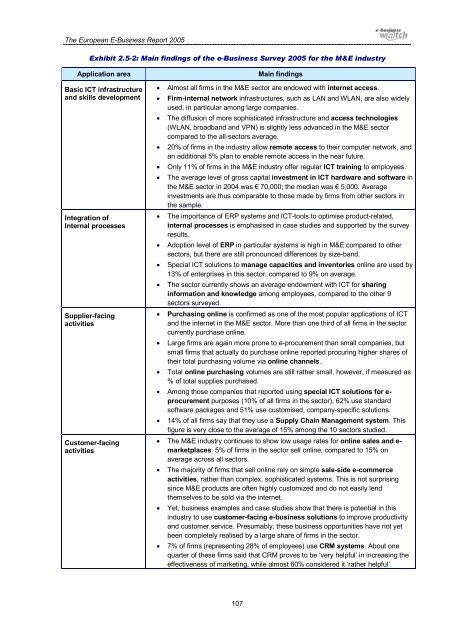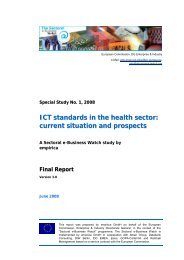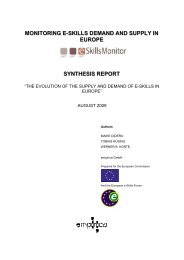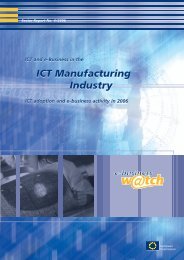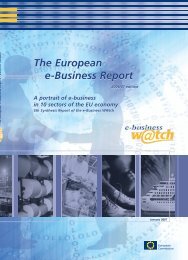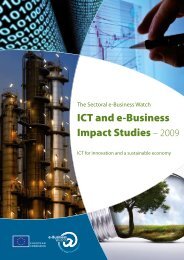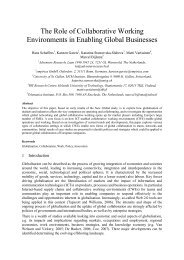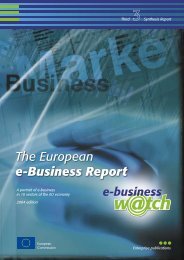The European e-Business Report The European e ... - empirica
The European e-Business Report The European e ... - empirica
The European e-Business Report The European e ... - empirica
Create successful ePaper yourself
Turn your PDF publications into a flip-book with our unique Google optimized e-Paper software.
<strong>The</strong> <strong>European</strong> E-<strong>Business</strong> <strong>Report</strong> 2005<br />
Exhibit 2.5-2: Main findings of the e-<strong>Business</strong> Survey 2005 for the M&E industry<br />
Application area<br />
Basic ICT infrastructure<br />
and skills development<br />
Integration of<br />
Internal processes<br />
Supplier-facing<br />
activities<br />
Customer-facing<br />
activities<br />
Main findings<br />
• Almost all firms in the M&E sector are endowed with internet access.<br />
• Firm-internal network infrastructures, such as LAN and WLAN, are also widely<br />
used, in particular among large companies.<br />
• <strong>The</strong> diffusion of more sophisticated infrastructure and access technologies<br />
(WLAN, broadband and VPN) is slightly less advanced in the M&E sector<br />
compared to the all-sectors average.<br />
• 20% of firms in the industry allow remote access to their computer network, and<br />
an additional 5% plan to enable remote access in the near future.<br />
• Only 11% of firms in the M&E industry offer regular ICT training to employees.<br />
• <strong>The</strong> average level of gross capital investment in ICT hardware and software in<br />
the M&E sector in 2004 was € 70,000; the median was € 5,000. Average<br />
investments are thus comparable to those made by firms from other sectors in<br />
the sample.<br />
• <strong>The</strong> importance of ERP systems and ICT-tools to optimise product-related,<br />
internal processes is emphasised in case studies and supported by the survey<br />
results.<br />
• Adoption level of ERP in particular systems is high in M&E compared to other<br />
sectors, but there are still pronounced differences by size-band.<br />
• Special ICT solutions to manage capacities and inventories online are used by<br />
13% of enterprises in this sector, compared to 9% on average.<br />
• <strong>The</strong> sector currently shows an average endowment with ICT for sharing<br />
information and knowledge among employees, compared to the other 9<br />
sectors surveyed.<br />
• Purchasing online is confirmed as one of the most popular applications of ICT<br />
and the internet in the M&E sector. More than one third of all firms in the sector<br />
currently purchase online.<br />
• Large firms are again more prone to e-procurement than small companies, but<br />
small firms that actually do purchase online reported procuring higher shares of<br />
their total purchasing volume via online channels.<br />
• Total online purchasing volumes are still rather small, however, if measured as<br />
% of total supplies purchased.<br />
• Among those companies that reported using special ICT solutions for e-<br />
procurement purposes (10% of all firms in the sector), 62% use standard<br />
software packages and 51% use customised, company-specific solutions.<br />
• 14% of all firms say that they use a Supply Chain Management system. This<br />
figure is very close to the average of 15% among the 10 sectors studied.<br />
• <strong>The</strong> M&E industry continues to show low usage rates for online sales and e-<br />
marketplaces. 5% of firms in the sector sell online, compared to 15% on<br />
average across all sectors.<br />
• <strong>The</strong> majority of firms that sell online rely on simple sale-side e-commerce<br />
activities, rather than complex, sophisticated systems. This is not surprising<br />
since M&E products are often highly customized and do not easily lend<br />
themselves to be sold via the internet.<br />
• Yet, business examples and case studies show that there is potential in this<br />
industry to use customer-facing e-business solutions to improve productivity<br />
and customer service. Presumably, these business opportunities have not yet<br />
been completely realised by a large share of firms in the sector.<br />
• 7% of firms (representing 28% of employees) use CRM systems. About one<br />
quarter of these firms said that CRM proves to be ‘very helpful’ in increasing the<br />
effectiveness of marketing, while almost 60% considered it ‘rather helpful’.<br />
107


